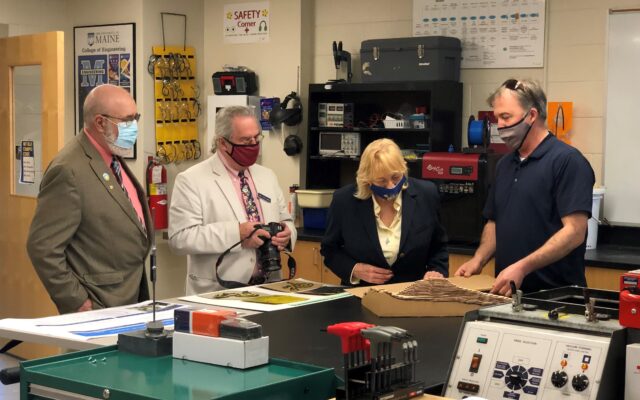
Investment in Maine’s Career and Technical Education Centers critical to economic recovery, says Gov. Mills
Governor’s Maine Jobs & Recovery Plan proposes $20 million for CTEs to train students and strengthen Maine’s workforce
FARMINGTON — During a tour of Foster Career and Technical Education Center in Farmington on May 14, Gov. Janet Mills highlighted the importance of Maine CTEs in training skilled workers and spurring economic recovery and long-term growth from the COVID-19 pandemic.
Mills has proposed investing $20 million for program, equipment and facility upgrades for the state’s 27 CTEs as part of the Maine Jobs & Recovery Plan, her proposal to invest more than $1 billion in discretionary Federal relief funds allocated to Maine under the American Rescue Plan Act.
Maine CTEs have not received a significant investment from the State since 1998.
“Jobs in the trades bring with them good skills and good pay, as well as stable, life-long careers, but it’s been decades since we’ve invested in the upgrades our career and technical education centers need to train students to fill those jobs,” said Mills. “Investment in Maine’s CTEs is critical to our economic recovery and long-term growth. With newly available funds, now is the time to make that investment to connect our students with rewarding careers and the businesses that are waiting to hire them.”
“Governor Mills’ Maine Jobs & Recovery Plan will support the ability of the Foster Career and Technical Education Center, and all 27 CTEs around the state, to help students grow into career-ready adults,” said Melissa Williams, director of the Foster CTE. “It is critically important that we have the ways and means to support students and create stronger relationships with business and industry partners. Thank you, Governor Mills, for this important investment.”
“Governor Mills’ support for Career and Technical Education Centers will help Maine’s CTEs unleash the potential of Maine’s young people, help fill Maine’s high-growth careers, and create sustained economic growth,” said Dave Keaton, CTE director of Region Two School of Applied Technology in Houlton and incoming the executive director of Maine Administrators of Career and Technical Education. “The investment from the Maine Jobs & Recovery Plan is long overdue, and will provide Maine students with exceptional learning opportunities and prepare them for future success as skilled members of Maine’s workforce.”
“Through the Foster CTE Center, I’ve had the opportunity to take business courses, intern at the United Way, and will be graduating with over 40 college credits,” said Mariah Thomas, a senior at Mt. Blue High School. “The support I’ve gotten from my school and programs has given me confidence and clarity in my college and career choices.”
“All my life I wanted to own my own veterinarian clinic, but didn’t know where to start. The courses I’ve taken at Foster CTE Center have given me the direction I needed,” said Allyson Walsh, a senior at Mt. Blue High School. “In the fall I will be attending the University of Maine to major in veterinary medicine and minor in business having already earned 46 college credits, which has given me a head start on my degree.”
“My experience in mechanical and architectural drafting helped spark my interest in engineering through hands-on modeling, design and innovation, which led to a degree in aerospace and mechanical engineering from Rensselaer Polytechnical Institute,” said James Brann, a 2007 graduate of the Foster CTE Center. “Whether students choose to pursue a college degree or enter the workforce directly, time spent at any of Maine’s Career and Technical Education schools is time well spent. Thank you to the educators who inspire our future machinists, engineers, loggers, mechanics, carpenters, electricians and more, and thank you to Governor Mills for recognizing the value of Maine programs like the one here at Foster CTE Center.”
“The relationship between Maine employers and the state’s Career and Technical Education Centers is important for Maine’s economy to ensure our students are learning the skills needed to thrive in skilled trades, health care, biotechnology, and more,” said Heather Johnson, commissioner of the Maine Department of Economic and Community Development. “The workforce investments of the Maine Jobs & Recovery Plan, which total more than $100 million, will create new economic opportunities for Maine students and employers.”
As Attorney General, Mills used funds she obtained through a settlement with Bath Fitter to create plumbing programs at several CTEs in Maine, including Foster CTE Center. In 2019, as governor, Mills also proposed a $5 million bond to support equipment upgrades at CTEs. The proposal was rejected by some members of the Legislature at the time despite bipartisan support.
Joining Mills was Melissa Williams, director of Foster CTE, Allyson Walsh and Mariah Thomas, Foster CTE Center students, and James Brann, a 2007 graduate of Foster CTE Center.
Maine’s public education system has 27 CTE schools that provide Maine students with training for careers, including in welding, nursing and emergency medicine, computer programming and pre-engineering, electrical, heating and cooling systems, building trades, early childhood education, marine trades, automotive technology, horticulture, hospitality and culinary arts, among others.
Mills has presented the Maine Jobs and Recovery Plan to the Legislature and will travel the state in the coming weeks to discuss it in more detail with the people of Maine.